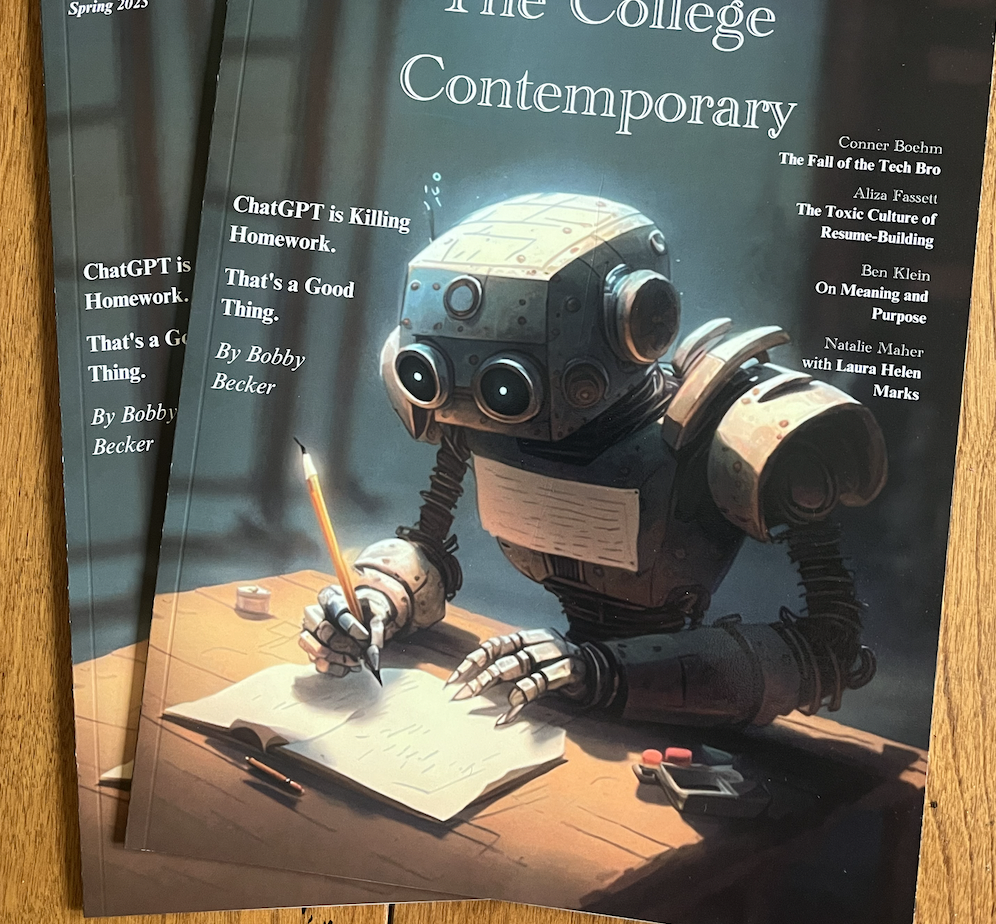Summary
Bobby Becker has used the funding from the Alvarez Spark Innovation Award to expand The College Contemporary, an intercollegiate magazine he founded at Tulane. The grant has allowed the publication to attract a diverse group of student writers from across the U.S., which has broadened the magazine's reach and has given more student writers the chance to publish their work. Bobby credits the Taylor Center's support for the magazine's recent growth and encourages other Tulane students to engage with the resources available to explore social entrepreneurship.
Alvarez Spark Innovation Award recipient, Bobby Becker, used the funding to expand The College Contemporary, an intercollegiate student magazine he founded during his sophomore year. With the funding, the publication recruited a diverse class of student writers from across the U.S., enabling them to share their perspectives on various pressing issues, in academia and beyond. Bobby, a senior majoring in philosophy and computer science, is preparing to pursue his master’s in computer science at Tulane’s School of Science and Engineering.
Two years ago, The College Contemporary released our first issue, which consisted of recycled essays given to me by my high school friends, which I then plastered onto a piece of newsprint and called a ‘newspaper.’ Though our first edition was beautifully imperfect—riddled with typos and designed with my amateurish graphic art background—the front-page piece gave me the chance to articulate my goals for the publication: to create an intercollegiate platform that could provide readers with access to higher-quality student journalism. I envisioned that, with the best student writers united under one publication, we could make major contributions to ongoing debates, offer unique perspectives on important issues, and pioneer a new, intercollegiate model that could help revitalize student journalism.

I dedicated a good portion of these last few years building out this project—recruiting student journalists to contribute to us, designing multiple websites, editing dozens of articles, and marketing our work through social media.
Over the past semester, the Alvarez Spark Innovation Award significantly accelerated our progress. We recruited a more diverse and talented group of writers than ever before, allowing me, as the main editor, to focus more on directly engaging with their ideas rather than correcting basic syntax. This led to an experience that was intellectually fulfilling and enriching, and also insanely fun.
One of our writers this semester, Mira Yu, contributed a fantastic piece on how AI’s capabilities in strategic video games indicate the technology’s potential to be used in warfare. Prior to contributing, Yu met with experts at the top AI-development companies, like OpenAI and Anthropic, and studied the inner workings of AI in depth through her computer science major at Harvard. Her profound expertise and writing skills made working with her an incredible privilege—one where I found myself learning more about the process of writing a good piece than I was able to teach.

I also got the chance to work with Ilan Ben-Meir, a philosophy PhD at Brown University, who contributed a deep, philosophical perspective about the nature of AI-generated art. He took me deep into the world of contemporary philosophy debates around AI and their overlap in ethics, epistemology, and even metaphysics—a journey which was as illuminating as it was headache-inducing. As a major in philosophy and someone who is considering pursuing a graduate degree in the field, the chance to see the thinking and research of a PhD candidate in-action was incredibly valuable.

I also joined the Changemaker Institute this past semester, which is an incubator for social ventures run by the Taylor Center. Over the course of weekly meetings with the program’s instructors and my peers, I learned a great deal about all the aspects around running a social venture. After hearing from guest speakers about the principles of design and effective branding, I did a complete redesign of our website—changing the cover art of each piece to cohere to a consistent theme. After this change, the website began receiving significantly more traffic, enhancing our reach and influence in student journalism.

The Changemaker Institute also had a heavy focus on teaching the philosophy behind what makes a social venture successful. They encouraged me to meet directly with ‘stakeholders’ of my project, such as student journalists and professors, to hear about their issues directly. I learned that, for the vast majority of student writers at the vast majority of schools, it is very difficult to find a publication that gives their work reach and credibility. For the schools that do have well-run student newspapers, articles are drafted and published on a strict timeline, which prevents writers from getting the chance to explore deeper nuances of their articles or to take greater stylistic risk.
These meetings made me realize that The College Contemporary could offer immediate value to student writers, providing a platform that could help them build their reputation and develop their long-form writing. While ‘revitalizing student journalism’ and ‘contributing to ongoing debates’ are worthy goals that I believe The College Contemporary should be aimed at, I’ve also come to believe that any successful social venture must complement their abstract aims with operations which add value in concrete, measurable ways. This is why, going forward, it is one of our main aims to recruit students from underrepresented colleges and backgrounds, giving all students with drive and intellectual honesty the chance to contribute to our publication.
I am incredibly thankful for the Taylor Center’s support for this project so far and feel as motivated as ever to making sure that The College Contemporary reaches its fullest potential. I hope that any Tulane student interested in social entrepreneurship takes advantage of the opportunities offered by the Taylor Center.
